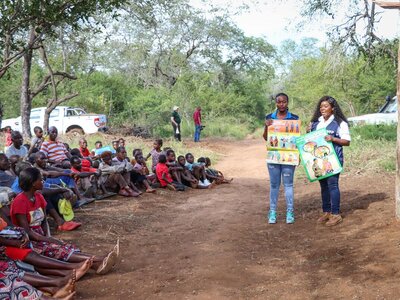Whether due to conflicts, natural disasters or
policy failures, food security and nutrition
are at risk in many parts of the world. Across
nations and continents, people increasingly
share expectations of accountability and good
governance.
Against this backdrop, governments have
unanimously adopted the
Sustainable Development Goals
(SDGs). These represent the broadest attempt
so far to tackle multiple challenges,
including persistent poverty, hunger and
malnutrition.
Achieving Zero Hunger (SDG 2) means that
countries must be able to draft and implement
policies that promote food security and
nutrition objectives. These underpin nations’
capacities to
withstand shocks and stress factors which limit the availability of food or
constrain access to it.
To be relevant and effective, food security
and nutrition policies must be rooted in
strong governance, responsive
institutions and an enabling environment. A combination is often involved, of
disaster risk management plans, robust
social protection systems and inclusive
economic and social programmes.
The World Food Programme (WFP) offers
country-tailored technical assistance to strengthen national systems. The WFP
Strategic Plan (2022-2025) highlights WFP’s
role in improving the sustainable
functioning of national systems and
programmes –
particularly emergency preparedness and
response, food systems and social
protection systems.
Country Capacity Strengthening (CCS)
constitutes a fundamental component of WFP’s
contribution to
sustainably addressing the underlying
drivers of food insecurity and
malnutrition.
In 2022, WFP developed an adaptive approach
to CCS that is driven by the national and
local context and presents a strategic
framework for working effectively with a
range of actors.
Five pathways help structure national demand
for capacity strengthening:
• Policy and
legislation
• Institutional
effectiveness and accountability
• Strategic planning and
financing
• Programme design and
delivery
• Engagement of
non-government actors
WFP’s context-driven support is articulated
around
national development priorities, critical needs and available resources.
Sustainable food security and nutrition
solutions are jointly decided by the
national government and development
partners. These solutions may involve
capacity for
emergency preparedness and response and
supply chain management; strengthening
social protection; and enhancing the
resilience of food systems.
Capacity strengthening for school-meal
programmes, and in crosscutting areas such
as climate action and resilience building,
are frequently included in WFP country
programmes.
WFP may also facilitate the transfer of
knowledge by third parties, for example
through
South-South or Triangular
Cooperation
initiatives, which promote peer-to-peer
sharing of best practices.



